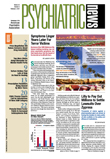New mothers are at an increased risk for experiencing psychiatric disorders, especially during the first weeks following delivery, according to a population-based study conducted in Denmark and published in the December 6, 2006, Journal of the American Medical Association.
New fathers were not at increased risk for experiencing psychiatric problems, suggesting that “causes of postpartum mental disorders are more strongly linked to an altered physiological process related to pregnancy and childbirth than to psychosocial aspects of motherhood,” said first author of the study, Trine Munk-Olsen, M.Sc.
Munk-Olsen is a doctoral candidate at the National Centre for Register-Based Research at Denmark's University of Aarhus.
She accessed data from the Danish Civil Registry to obtain demographic information on people born in Denmark between January 1, 1955, and July 1, 1990, who were alive at their 15th birthday.
She then linked that population (2,357,942) with the Danish Psychiatric Central Register, which contains data, including diagnosis, on all admissions to Danish psychiatric hospitals. The database includes information on 600,000 people and 1.6 million admissions.
Since 1995 the database has also included information on outpatient psychiatric visits.
Munk-Olsen followed the more than 2 million cohort members from their 15th birthday or January 1, 1973 (whichever came later), until their date of death, emigration from Denmark, or July 1, 2005 (whichever came first).
According to the findings, between 1973 and 2005, 1,171 women and 658 men were admitted to a psychiatric hospital for the first time during the first year after becoming parents.
For new mothers, Munk-Olsen found that the first weeks and months after delivery were associated with an increased risk of first hospital admission with any mental disorder diagnosis. More specifically, the period from 10 to 19 days postpartum was associated with more than a seven-fold risk for an inpatient admission compared with women who had given birth 11 to 12 months prior.
In the 10 to 19 days after delivery, mothers were more than four times as likely to be hopitalized for a psychiatric disorder as were women who had not given birth.
The increased risk of admission among mothers remained statistically significant through the first three months after delivery.
Ten to 19 days after delivery, new mothers were 2.67 times as likely to have an outpatient psychiatric visit as were mothers who gave birth about a year earlier.
Munk-Olsen examined specific diagnoses of those admitted to Danish psychiatric hospitals and found that increased risk of admission for unipolar depression persisted for five months postpartum, for bipolar disorder it persisted two months postpartum, and for schizophrenia and other psychotic disorders, the higher-risk period was 30 days.
“We hope that these findings can be helpful to the different health professionals working with new mothers,” said Munk-Olsen. In Denmark there is no standardized screening for postpartum mental disorders, but if screening is considered, our study shows the timing of the risk.”
She added that it would be helpful to know more about recurrence of mental disorders during the postpartum period, since she and her colleagues studied only parents never previously treated for a mental disorder.
An abstract of “New Parents and Mental Disorders: A Population-Based Register Study” is posted at<jama.ama-assn.org/cgi/content/abstract/296/21/2582>.▪
